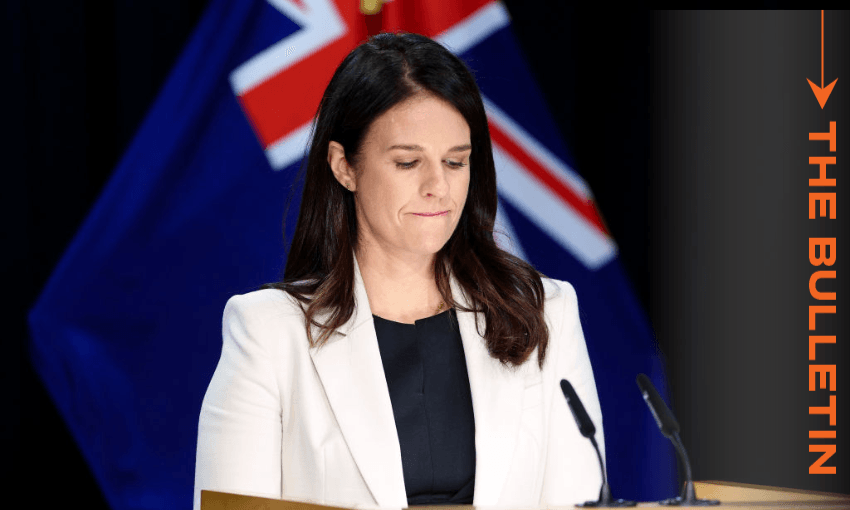To receive The Bulletin in full each weekday, sign up here.
The plan for the day – and who won’t be there
An overdue and much-anticipated apology for abuse in care will occur at parliament, along with concurrent events in Manukau and Christchurch, with up to 1,200 survivors of such abuse expected to attend from around the country – the culmination of an inquiry which detailed abuse of unimaginable severity and scale.
The formal parliamentary ceremony will commence with a mihi whakatau, before testimony from survivors and apologies from government agency leaders. Prime minister Chris Luxon will deliver the national apology at 11.30am, followed by a statement from Labour leader Chris Hipkins – an acknowledgement that both the inquiry and the abuse spanned multiple governments.
Following the national apology, the government will introduce the Responding to Abuse in Care Legislation Amendment Bill to parliament. The Bill will:
- Remove strip searches of children in care and provide new search powers for people visiting youth justice facilities.
- Strengthen restrictions for people working with young children.
- Enforce better record keeping by Government agencies.
- Amend the Crimes Act to include disability in the definition of vulnerable adult.
Not all survivors who attend will be part of the ceremony – a number will be protesting outside parliament, with Stuff reporting on Mike Ledingham, who typifies many critics who charge that the lack of a defined position on compensation renders the ceremony “hollow”. This is echoed by the Greens’ spokesperson for children, Kahurangi Carter, who said in a statement that “an apology without accountability – or worse, actively perpetuating the same harms – is nothing more than empty air.”
A national stain, acknowledged
The Abuse in Care Inquiry was announced in December of 2017, not long after the election of the Jacinda Ardern-led coalition and just days before a similar Royal Commission delivered its final report in Australia (showing how lagging we were in such a reckoning). Our commission reaches a sombre milestone today, with the formal apology to victims of that abuse, corralled by Erica Stanford, the minister in charge of responding to July’s enormous, 3,000 page report.
It detailed the vast scale of abuse at state and faith-based institutions in New Zealand between 1950 and 1999: between 113,000 and 253,000 children, young people and adults. The Spinoff reported that it made 138 recommendations, including creating a Ministry for the Care System to oversee the care system, and urged the government to implement the 95 recommendations of the commission’s 2021 interim report. The report also called upon political, religious, public service, professional and care provider leaders to issue public apologies – here is the full, deeply troubling list it named – as well as law changes to relevant legislation.
The challenges which remain
Two key issues ensure that the apology, while hugely significant, will not be anything like the end of the conversation about abuse. The first is that many believe the government’s planned boot camps could resemble the kind of environments which, like Great Barrier’s Te Whakapakari Youth Programme, saw extremely serious historic abuse.
The second is the vexed issue of compensation. Payments to this point are considered manifestly inadequate – the inquiry says that “state agencies calculated their monetary payments based on the acts of abuse, not the ongoing effects of abuse”. Yet because of the sheer number of survivors, and the potential need to compensate whānau too, any real financial response is likely to run to enormous sums. For a window into the layered and complex problems with our current system of redress, please read this powerful piece by state care abuse survivor Steve Goodlass on The Spinoff.
An inexplicable decision, reversed
A large number of journalists have helped tell the stories of those who endured decades of horrific abuse at the hands of the state, or faith-based institutions, including The Spinoff – the Quarter Million remains one of the most significant pieces of work we have ever undertaken. No journalist has worked harder nor for longer than Aaron Smale, who won awards after spending years unravelling the story, including many powerful features for The Spinoff. Some consider his work to have been a crucial part of what prompted the inquiry in the first place.
So it was extremely concerning that, according to Newsroom, which has published much of his recent journalism, he was initially barred from attending the ceremony. Speaker Gerry Brownlee made the decision, following feedback to Newsroom about Smale’s questions at events involving the prime minister and children’s minister Karen Chhour.
It would have deprived the apology of one of the most knowledgeable and passionate reporters on the inquiry. Toby Manhire wrote forcefully about why it was such an unacceptable position, while lawyer Sonja Cooper decried it in a story for Stuff, saying Smale had “unapologetically exposed the extent to which current and past state officials and governments have tried to bury information and adopted tactics to ensure that survivors would not receive justice”. Thankfully, common sense prevailed, and his access was restored by mid-afternoon – though RNZ reported that it came with the inexplicable and paternalistic proviso that he be accompanied by a Newsroom reporter at all times.

